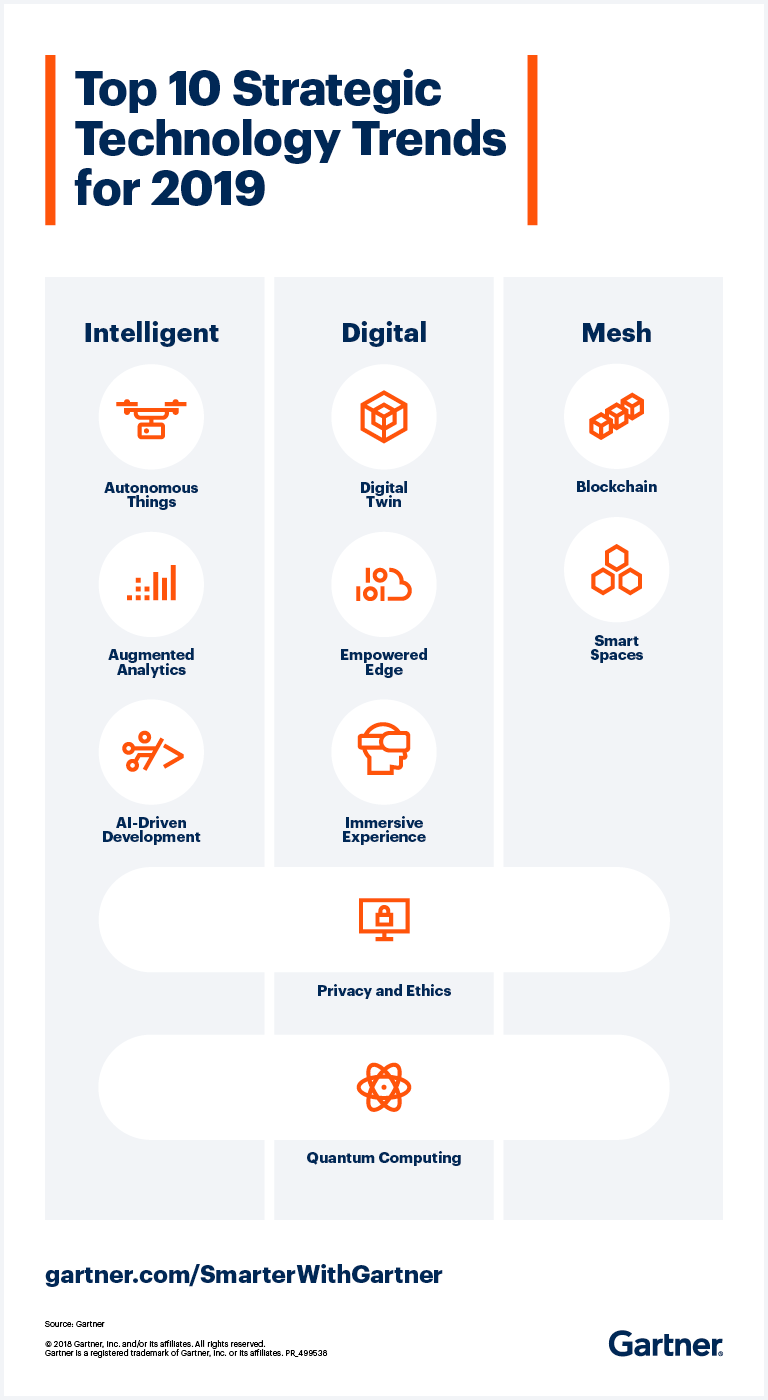The annual list by Gartner outlining technology trends is a must read for all folks interested in tech. These are, according to Gartner, the technology trends that organisations need to understand and explore heading into 2019, and which will be impactful and transformative through to 2023. Read the Gartner press release for full details, here is a quick summary of the technology trends:
1. Autonomous Things:
- This is the use of AI to do things normally done by humans
- Autonomous things use AI to interact with the environment around them
- There are 5 types of Autonomous Things:
- Robotics, Vehicles, Drones, Appliances, Agents
- Autonomous Things exist across the following landscapes:
- Sea, Land, Air, Digital
2. Augmented Analytics:
- The sheer volume of data available to data scientists is overwhelming and the fear is that businesses will miss important insights/trends from their analysis
- As a result, Gartner state “by 2020, more than 40% of data science tasks will be automated”
- This trend involves using Machine Learning to revolutionise data and data analytics
3. AI-Driven Development:
- AI driven development is looking for ways (tools, technologies & best practices) to put AI into applications and using AI during the development process. Gartner outline 3 ways in which this is happening:
- AI based solutions are growing beyond AI tools and applications for data scientists to AI tools and applications focusing for developers
- AI solutions are enhanced with AI-based capabilities that help developers and automate tasks related to the development of AI solutions
- AI enabled tools are moving from helping and automating the process of application development to now having business domain expertise and business solution design
- Gartner explain this will result in a “citizen application developer” where non-professionals will use AI based tools to generate new solutions with a new and enhanced level of flexibility and sophistication
4. Digital Twins:
- Digital twin is a digital copy or representation of another real world object, process or system
- The idea of a digital twin is not new, but now the idea has developed as follow:
- Quality and strength of models and how they support business processes
- The relationship with the real world is better, in real time – enabling better monitoring and control
- The ability to utilise advanced big data analytics and AI to gain unique insights and enable new business opportunities
- The ability to understand and ask “what if”
- Keep in mind that Gartner believe by 2020 there will be more than 20 billion connected sensors/endpoints/digital twins for billions of things
5. Empowered Edge:
- Edge computing is the idea of having information processing closer to the sources of information, in effect keeping things local so to reduce traffic and latency
- This is closely to the development of the Internet of Things (IoT) and the need to keep processing local rather than going back and forth between a centralised cloud server
- This need to process locally will drive the development of AI chips with better processing power, storage and other functionality
6. Immersive Experience:
- Virtual reality (VR), augmented reality (AR) and mixed reality (MR) are changing the way in which we interpret the world and these technologies combined will lead to the development of completely immersive user experiences
- This is all about going from individual devices and separate user interfaces to one where the experience is multichannel and multimodal
- Gartner explain this as the use of all human senses within a multichannel experience across multimodal devices – “the environment is the computer”
7. Blockchain:
- Blockchain, a type of distributed ledger technology, will provide companies with faster, irrevocable and traceable transactions without a centralised authority
- Gartner recognise the challenges with blockchain but also the “significant potential for disruption” and encourage organisations to understand and evaluate the technology in readiness for the future
8. Smart Spaces:
- Smart space is an environment where humans and technology interact in a open, connected, coordinated and intelligent ecosystems
- Smart spaces take individual technologies that are used in silos to one where they are packaged together into a collaborative and interactive environment
- An example of smart spaces are smart cities
9. Digital Ethics and Privacy:
- This technology trend refers to the increasing importance of data, in particular personal data, and the concern that people have about how this information is used by personal and private entities
- Respecting consumer privacy and driving trust are key to future success, Gartner suggest a shift from:
- “Are we compliant?” to “Are we doing the right thing?”
10. Quantum Computing (QC)
- Quantum computing sounds very complicated with references to subatomic particles and quantum bits, thankfully Gartner provide a nice simple explanation for folks like me
- Imagine a library…. classic computers would read the books in the library one at a time…. quantum computers can read all of the books in the library at the same time
- Similarly, quantum computers are able to work on millions of computations at the same time
- Quantum computing is still emerging, so Gartner suggest understanding the technology and it’s potential uses

Very nice